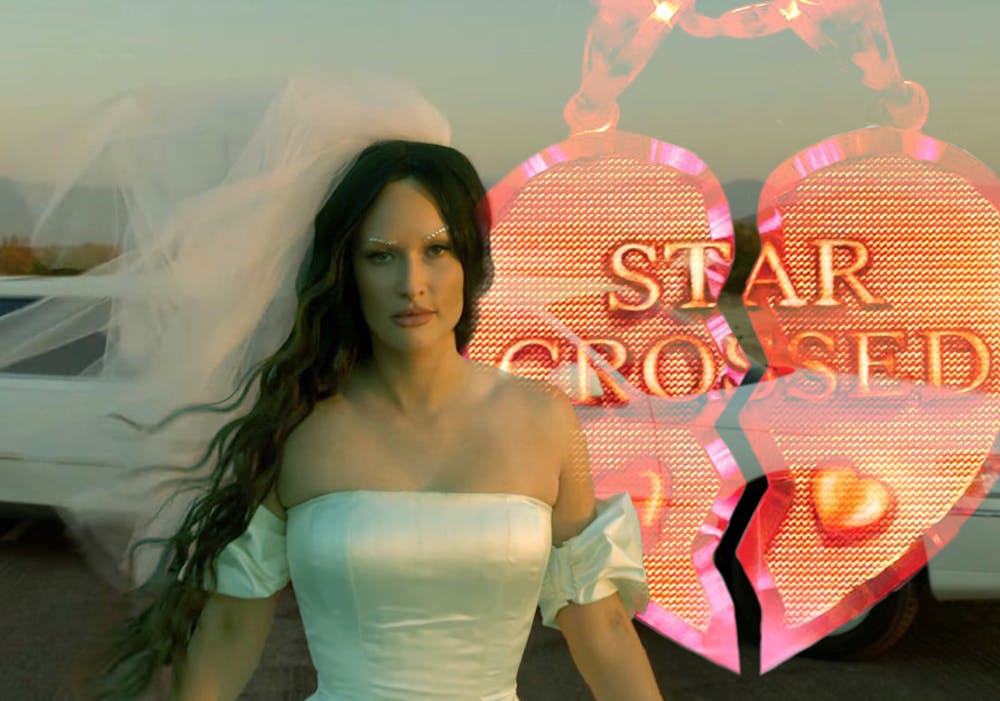Through star–crossed, Kacey Musgraves narrates the cautionary tale of life after a beautiful marriage and a devastating divorce. Despite the hype she created surrounding her recent release—with promotional efforts such as interviews and a short film—she tells the story gently and thoughtfully, almost like a secret told to a close friend, in hushed tones and wistful sighs.
Musgraves released the record, which she described as a “modern tragedy in three acts,” on Sept. 10. The record follows her critically acclaimed country–pop album Golden Hour, in which she welcomed listeners into a bright, shiny world accompanied by a lover who “[sets it] on fire.”
During its first act, star–crossed retells the love story constructed in Golden Hour. The rest of the album, however, leaves that romance in the past, mourning two lovers whose “golden hour faded black.”
The record opens with the eponymous prelude, “star–crossed,” which immediately displays Musgraves’ angelic vocals before she begins to share the tale. The listener is immediately told what to expect: the tragedy of two partners who were “ripped right at the seams.”
Musgraves spins a yarn that goes in surprising directions as the chain of events unfolds. She had promised a post–divorce record that would “burst the bubble” of her image as a “starry–eyed, rose–colored glasses kinda girl.” However, she doesn’t present an album filled with all–consuming anger or pointed fingers. In fact, her ex–husband, who would presumably be the bad guy, is barely a secondary character in the story. It’s a tragedy without a villain: two star–crossed lovers who just weren’t meant to be.
Still, during the prelude, Musgraves emphasizes that “no one is to blame” despite the fact that the lovers “called all the angels to save [them].” However, she secures their ill fate by saying they must have gotten lost.
Instead of anger, the album is primarily an encapsulation of nostalgia and melancholy. Musgraves doesn’t curse her ex–husband; she doesn’t even wish the relationship never happened. More than anything, she longs for the “simple times” before her failed relationship tarnished her perspective of the past.
Following the prelude, the songwriter reminisces about the early stages of the relationship—retelling the events she first shared in Golden Hour, but with the benefit of hindsight.
In “good wife,” Musgraves gives deeper insights into the dynamics of what the listener now knows is a failed relationship. Without this prior knowledge, however, the red flags might go unnoticed, as she sings about the couple’s need for each other. Even though she acknowledges she could make do without him, the “house just wouldn’t be a home.”
Overall, Musgraves questions her role in the demise of the relationship. If everything were perfect–if life were a movie–the relationship would have worked out. The listener is left to wonder what destroyed it in the first place.
The second single “justified” marks a change in the album, indicating the second act of the tragedy in which Musgraves switches from reflecting on a lost love to dealing with the emotional aftermath. She sings about the road to healing—as she sits behind the wheel of her car in the music video—going from hate to love, from “cry[ing] just a little” to “laugh[ing] in the middle.” Musgraves uses the track to come to terms with her decisions and the subsequent emotions.
More excitingly, this section of the album dips its toe slightly back into disco–pop, making you want to dance along while screaming the lyrics and admittedly shedding a tear or two. The best example of this is “breadwinner”—sonically reminiscent of “High Horse”—in which Musgraves gives the listener advice based on what she wishes she had known during her relationship.
Sure enough, as the listener starts to expect similar themes to Olivia Rodrigo's “good 4 u”—burning bedrooms and psycho ex–girlfriend vibes—the album shifts once again.
To close the project, Musgraves looks introspectively and explores what the future holds for her. She recalls wisdom her dad imposed when she was a kid: “Keep lookin’ up / Don’t let the world bring you down / Keep your head in the clouds / And your feet on the ground.” Musgraves uses the last couple of songs to restate her strength and resilience, still present despite the difficult times she faced. Sonically, the songs in the third act also signify hope—the soft strings paired with pop–disco beats point towards bittersweetness and lessons learned, but with a light at the end of the tunnel.
The only major miss seems to be the tragedy’s conclusion, a cover of Violeta Parra’s “Gracias a la vida.” Although the lyrics accurately represent the journey of the album—thanking life for every gift despite its hardships—a stronger closing could have been achieved with a song penned by Musgraves herself. She manages to transform the song to represent changes in her narrative: the song is warped at times, indicating different points of her story. However, some of these changes seem unnecessary to such an iconic song. Despite this, it is notable that Musgraves honored Parra by singing the song in Spanish.
All in all, star–crossed is a successful successor to Golden Hour, continuing to tell a love story that enthralled so many. Musgraves gives listeners insight into the experience of a complicated relationship, where a time once full of love can lead to heartbreak, but also to major life lessons.







